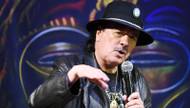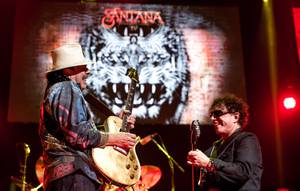Last weekend, Orchestral Manoeuvres in the Dark was in Arizona to celebrate the opening of a MOCA Tucson exhibit, Dazzled: OMD, Memphis Design, and Beyond, that features (among other things) a multimedia aspect based on the artwork and music of the group’s 1983 LP, Dazzle Ships. The cutting-edge installation is just the latest intriguing step forward for the Liverpool-based synth-pop icons, who spent much of fall 2018 looking back and celebrating their 40th anniversary, with a career-spanning concert collaboration with the Royal Liverpool Philharmonic Orchestra and a luxurious book on the history of the band, Pretending to See the Future.
“It’s been quite remarkable to reflect on the journey,” says vocalist/songwriter Andy McCluskey, who co-founded OMD in 1978 with childhood friend Paul Humphreys. McCluskey is calling from LA, where he’s staying at the house of OMD’s ex-manager, who currently manages Katy Perry. (There’s been no sightings of the pop star, although he admits with a hearty laugh, “I’ve been listening to her new single, which nobody else has heard.”)
“We never aspired to be a successful pop group. It wasn’t a dream. Paul and I aspired to make crazy, weird music. And we were [doing that], in the early days. Even our best friends thought what we were doing was bloody awful. They didn’t get it at all. That’s why we started as a two-piece technically, because nobody wanted to play with us.” He laughs.
“It was quite a surprise when people started to say, ‘You know, what you’re doing could be the future of pop music,’” McCluskey adds. “And we were like—I think we used a word beginning with ‘F’ and said, ‘No, we’re experimental, actually, don’t call us pop.’”
Early OMD efforts are indeed monuments to avant-garde electronic music. But as the ’80s progressed, the band embraced glossier production and accessible arrangements, leading to U.S. Top 40 success with “Dreaming,” “So In Love” and the smash Pretty in Pink soundtrack cut “If You Leave.” OMD is more adept at reconciling extremes these days—in 2017, the band released a fine new electro LP, The Punishment of Luxury, which combines these two approaches quite neatly—although McCluskey is well aware of the band’s split legacy.
“Obviously, in America, if the average person in the street was asked, ‘Do you know OMD?’ They’d go, ‘Oh yeah, “If You Leave,”’ and then they might name a handful of other songs they may have heard on the radio,” he says. “But there are people who still go deep with us, who remember us when we were just [on] independent radio or college radio, and they liked the stuff that, at the time, wasn’t big in America because our label wasn’t really promoting us.
“It was big in Europe; it was kind of strange music. And how did that get in the charts in Europe? That was something we’ve always really delighted in, [which] is actually confounding people’s expectations—and actually very often having hit singles with songs that can kind of defy what the normal pop song would be considered to be.”
Since OMD hasn’t headlined in Vegas since 2011, McCluskey promises a show that’s “going to be great fun,” especially for loyalists who appreciate all facets of the band. “That’s a proper full, hour-and-a-half [set] covering 40 years history of OMD,” he says. “But we will invariably play lots of hits—and we will invariably throw in a couple of weird ones just for the hardcore fans, too.”
Bonus quotes
On striking a balance between nostalgia and artistic progression: We faced a dilemma. When the band reformed—and now, you know, the funny thing is that the band has been reformed for longer than we were formed in the first place, before we split up. After a couple of years of enjoying the nostalgia, enjoying actually playing live again and hanging out with our friends and doing gigs, we kind of sat down and went, “Okay, we have a dilemma now, don’t we?" Because essentially, the question is like, what does a futurist band do in the postmodern future? Can we just be a tribute band to ourselves? Is that acceptable? Our original direction was to ask questions, to try to explore, to try to find a musical way of actually asking impertinent questions and unusual lyrics. Can we actually still do that—or are we confined to nostalgia?
And don’t get me wrong: It’s okay if you just want to do nostalgia. We know when we play live, the vast majority of the audience, they love to hear the big hit, because it’s reassuring for them. It’s a memory that is important to them. They love the song, they’ve sung along with it, they’ve danced to it, they’ve cried to it, they’ve been in love, they’ve been out of love. [Those songs have] become part of the tapestry of people’s lives, and that’s a blessing to be able to say that.
But we actually said to ourselves, can we do both? Can we actually celebrate our past and still be relevant and contemporary? And that’s not easy.
I’m 60 years old this summer, and sitting in the studio, hour after hour, day after day, trying to find inspiration and make something good, it’s hard. There’s sometimes I go, "I think I’d rather go hang out with my kids or go and see some friends." Or, “I did 100 gigs last year. Maybe I just want to go on holiday now?”
Trying to find the inspiration and the desire to actually work hard is difficult. So I understand why many of my contemporaries don’t want to have to sit in the studio for months and months and really pull something out of the bag that’s worth listening to. But I would suggest to them, if they haven’t got the hunger to do it, they really shouldn’t do it, because they’re just going to make a rather empty pastiche of their own music.
On not remembering the band's first gig and myth-making: I started to feel like we were some kind of suspect nouveau religion with a creation myth. Because for years, we have said to people, "The first gig we ever played was with Joy Division in October of 1978 at Eric’s Club in Liverpool." I was adamant about it. And I spoke to Stephen Morris, the drummer in New Order. He said, “Yeah, I remember playing a gig with you at Eric’s." I said “Was it October the 12th, ‘78?" He looks and he said, “No, no, I’ve got notes on that, we played in Manchester that night, so it must have been a different night.” I’m like, “Oh, shit. We’ve been telling people for 30 years our first gig was with Joy Division, and it wasn’t." Turns out, we supported a comedian from Manchester, not Joy Division. So we had our own creation myth. [Laughs]
Interestingly enough, the comedian was signed to Factory Records, who both us and Joy Division then went on to sign to. His name was John Dowie, so maybe he had the same initials, JD, maybe that’s where the confusion came from. [Laughs]
On Vegas memories: We played in Vegas with the Thompson Twins and their crew was supposed to stay, and they left overnight. One of the crew guys gave me the key to his room, because I think we were going to be sleeping on our bus, but they had spare rooms. So we’re like, “Oh, okay, well, we don’t have to sleep on the bus." I remember walking into this room and it’s like, this is a frickin’ suite with a big, round bed and a minibar that’s actually got alcohol in it. I’m thinking, "Their crew have got better rooms than we have." [Laughs.]
OMD January 24, 7:30 p.m., $35-$47, House of Blues, 702-632-7600.







